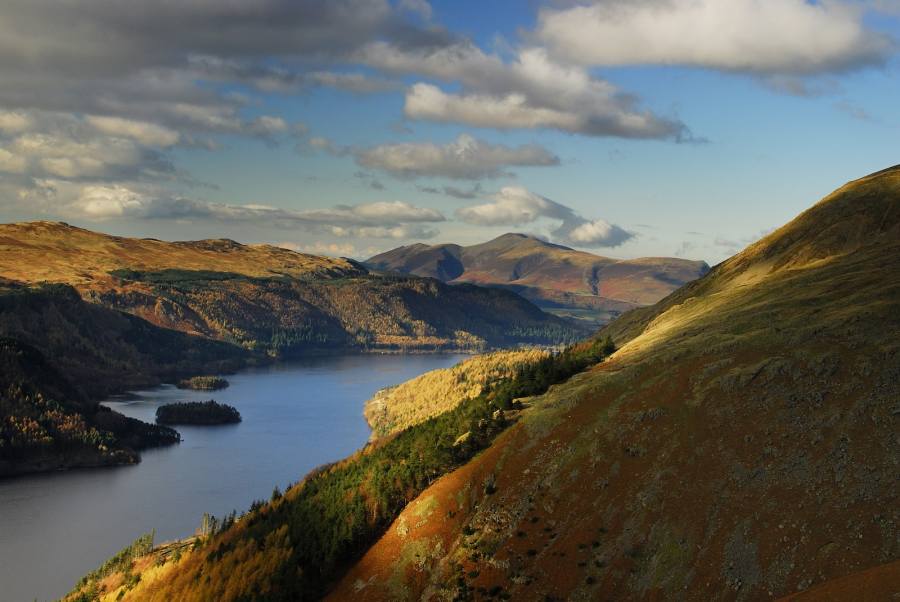Roger Smith looks at the increasingly murky background to the zipwire proposal
Roger’s column is due to be printed in the February 2018 issue of The Great Outdoors. However, due to the intense scrutiny this zipwire proposal is under right now – and the fact that time is short to object – we decided to publish it early.
Edited 22 December to clarify that Terry Abraham was only free to comment on the proposal in a personal capacity while an ambassador. The previous version of this column could be read to imply that he was proscribed from speaking against it at all, which was not the case.
The proposal by Tree Top Treks to sling eight zipwires across Thirlmere in the heart of the Lake District National Park looks set to become one of the major conservation issues of 2018.
The proposal is for two 1km zipwire rides. Starting on the eastern side of the lake at Swirls, you would ‘fly’ across the lake to its western side, walk or be shuttled to the Fisher Crag area and then ‘fly’ back to Swirls. The existing car park at Swirls would be considerably enlarged with a new toilet block and other facilities. Both ends of the zipwire would be in the forest.
The zipwire proposal has drawn objections from conservation and recreation bodies including the BMC, the Wainwright Society and Friends of the Lake District. In their proposal, Tree Top Trek claim that the scheme ‘has been assessed as not proving harmful to World Heritage Status’ (granted to the LDNP in July 2017) and would have ‘minimal visual impact’. They say it would be a ‘family friendly, world class visitor attraction’ and would contribute £600,000 to the local economy each year.
They also point to the fact that there are already zipwire rides at Grizedale and Whinlatter. This to me is an entirely spurious point – it’s like saying that if two Old Masters in the National Gallery are vandalised it is ok to vandalise all the other paintings as well.
FoLD say that the zipwire proposal is ‘wholly inappropriate’ and would ‘set a precedent for further commercial activity in the National Park’. The LDNP Authority have still to consider the matter in detail but have asked Tree Top Trek for further information, saying significantly that the plans ‘do not appear to cover the impact of the new activity within the landscape’.
Is the new zipwire plan an appropriate development for the heart of our most-visited National Park, also now a World Heritage Site? There can only be one answer to that – no, it isn’t
The whole affair was thrown into confusion on Friday 15 December at the launch of a new charity called the Lake District Foundation. The Foundation’s partners include Cumbria Tourism and the LDNP Authority. The distinguished film-maker Terry Abraham had been appointed as an ambassador for the LDF but at the launch he stood up and, in an impassioned plea for conservation, publicly resigned, saying that he could not continue in the role as he had been told the charity was neutral on the issue of the Thirlmere zipwires. He had also been told he would not be allowed to express his opposition to Thirlmere while speaking as an LDF ambassador. He could only do so as an individual. Terry said this “didn’t feel right” and also he found the Foundation’s neutral stance “to be at extreme odds with what the charity claims to represent”. (Ed – the full text of Terry’s statement can be read here.)
Another tangle in the knot is that one of the LDF’s Trustees is Gill Haigh, Managing Director of Cumbria Tourism, who are firmly in favour of Thirlmere. Another Trustee is Richard Leafe, Chief Executive of the LDNPA. He must be considering his position – how can he possibly give his NPA board genuinely independent advice when he is a Trustee of LDF, who are, tacitly at least, supporting the zipwire proposal, even though it is surely anomalous for a supposed conservation charity to do so? Not only is LDF of which Richard Leafe a trustee remaining neutral, but Tree Top Trek in their submitted proposal state they make legacy funding to LDF from the zip wires.
This all piles fog on fog, but to me the basic issue could not be more simple. Is the new zipwire plan an appropriate development for the heart of our most-visited National Park, also now a World Heritage Site? There can only be one answer to that – no, it isn’t.
Let me remind you of the Sandford Principle, on which the establishment of all our National Parks was based 60 years ago. It says: ‘If it appears that there is a conflict between conservation and development, the National Park Authority shall attach greater weight to the purpose of conserving and enhancing the natural beauty, wildlife and cultural heritage of the area.’
If the Lake District is to retain its status as a true National Park and be worthy of its accolade as a World Heritage Site, commercialisation such as this cannot be permitted
I would hope that Principle is totally accepted by the LDNPA, in which case there is no need for further discussion. The zipwire scheme is clearly inappropriate and should not go ahead. If it is passed by the LDNPA then I believe those members of the LDNPA board who vote for it should be summarily dismissed and replaced by people who genuinely understand and support Sandford.
There is an irony here of course in that Thirlmere was the scene of an early conservation battle in the 1890s when plans to greatly enlarge the natural lake in order to form a reservoir to supply the burgeoning needs of the city of Manchester were announced. That battle was lost but that does not make Thirlmere a ‘degraded landscape’ as supporters of the zipwire scheme have claimed. Some 120 years have passed and Thirlmere, sitting as it does at the western foot of Helvellyn, has become an integral part of the Lake District scene.
There will no doubt be many more twists and turns in this story but I would urge those who have the task of making the crucial decisions to keep their minds firmly focused on the underlying principles involved. If the Lake District is to retain its status as a true National Park and be worthy of its accolade as a World Heritage Site, commercialisation such as this cannot be permitted. To do otherwise would be to deliberately degrade the quality of the Park, and that is certainly not something I would like to have on my conscience.
How you can make your voice heard
If you agree with the view of The Great Outdoors and so many other people and organisations who love the Lake District, please consider objecting to the Thirlmere zipwire proposal. All objections must be sent by 2 January 2018. Email thirlmereactivity@lakedistrict.gov.uk. For more information and guidance, visit the Friends of the Lake District’s page on this proposal.
Header image © Shutterstock / Stewart Smith Photography









